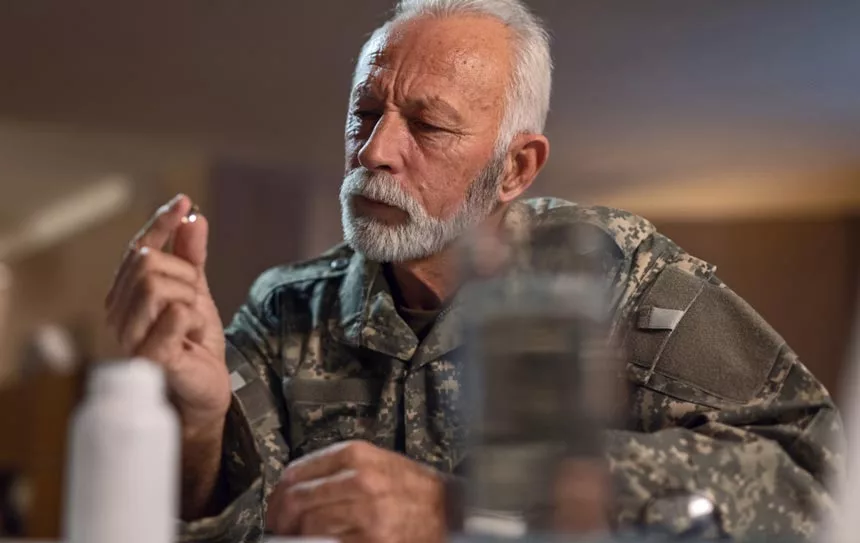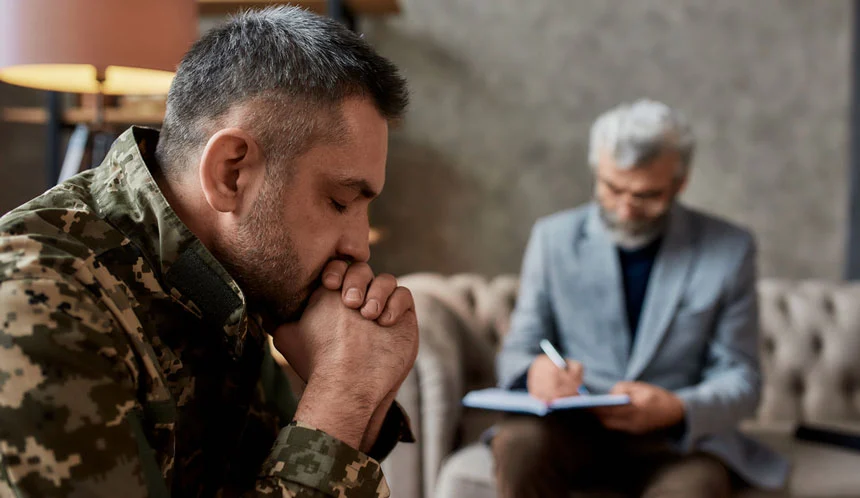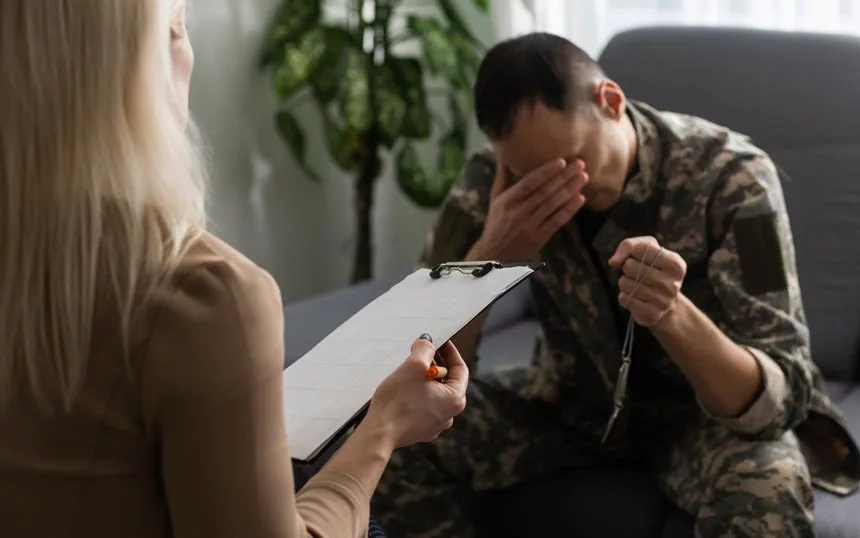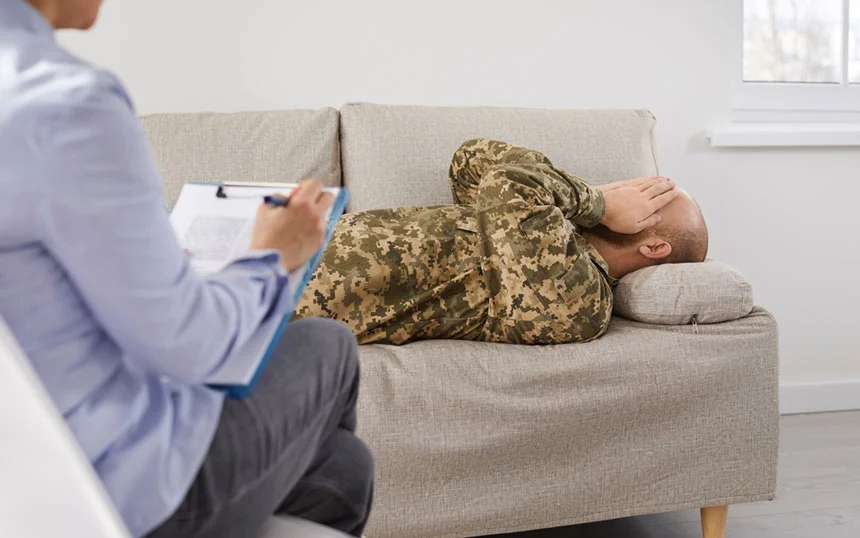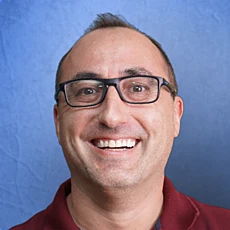Finding Substance Use Treatment for Veterans
Table of Contents
- Finding Substance Use Treatment for Veterans
- Why Do Veterans Have a Higher Risk of Drug and Alcohol Abuse?
- What is Veteran Affairs?
- What Services Does VA Provide for Veterans With Substance Use Disorders?
- Medical Detox for Veterans
- Medication-Assisted Treatment for Veterans
- Mental Health Counseling for Veterans
- Access to Alcohol and Drug Rehab Centers for Veterans
- Inpatient Rehab for Veterans: What to Look For
- Tricare Insurance and Paying for Drug and Alcohol Rehab
- Treating PTSD and Veteran Concerns
- Achieving Dedicated Therapy
- FAQs on Inpatient Rehab for Veterans
- Find an Inpatient Rehab for Veterans Now!
- Medically Reviewed By
Many people struggle with drug and alcohol addiction, often for various different reasons. One of the biggest populations affected by substance abuse, however, is veterans. The demand for inpatient rehab for veterans is high and growing each year.
You may already know that many veterans experience problems with alcohol, tobacco, street drugs, and prescription medications. These are often used as coping mechanisms for various reasons, including chronic pain, mental health issues, and the struggle to re-adjust to civilian life.
If you or a loved one is a veteran and are struggling with alcohol and drug abuse, help is available. Keep reading to find out how you can find the right inpatient rehab for veterans to help overcome issues with alcohol or drugs!
Why Do Veterans Have a Higher Risk of Drug and Alcohol Abuse?
Unfortunately, veterans struggle with a number of issues, both while actively serving and once discharged. One of the most common of these issues is substance abuse.
Experiencing deployments, combat exposure, combat-related injuries, military sexual trauma, or any other traumatic event can all cause former military members a number of physical or psychological problems, including excessive drinking or drug use.
In fact, veterans with substance use disorders are 3-4 times more likely to be diagnosed with mental health conditions. The most common of which is post-traumatic stress disorder (PTSD), depression, and anxiety.
In some cases, veterans may abuse their prescribed opioid medications that are meant to help ease pain from an injury sustained in service. This is because opioids are highly addictive, particularly when used by someone who may have other underlying emotional pain.
What is Veteran Affairs?
The United States Department of Veterans Affairs, or the VA, is a Cabinet-level executive branch department of the federal government that provides life-long healthcare services to eligible military Veterans.
The branch currently works with 170 VA medical centers and outpatient clinics throughout the nation, providing necessary care for United States Veterans and military families.
VA health care benefits are eligible to previously active military service members, as well as those who served in the naval or air service without receiving a dishonorable discharge.
What Services Does VA Provide for Veterans With Substance Use Disorders?
Veteran Affairs provides many options for veterans who are seeking help for their drug and alcohol problems. Which services you will be able to receive will depend on your specific care needs. Some of these may include:
- Medical Detox
- Medication-Assisted Treatment
- Mental Health Treatment and Counseling
- Inpatient and Outpatient Rehab Services
While checking out your local VA medical center might be helpful, many veterans tend to avoid using this service, as it can be limiting for their treatment options. Some vets have also turned away from the VA due to its tendency to over-prescribe medications, along with a hesitation to embrace modern recovery methods.
Fortunately, there is a multitude of recovery services available to people of all backgrounds, including veterans.
Medical Detox for Veterans
For those with severe addictions to drugs and alcohol, their best option to begin the treatment process will be to undergo a medical detox. This will allow them to be weaned off of an abused substance under constant medical supervision.
Taking part in a medical detox program can help manage and even prevent many withdrawal symptoms from occurring during the recovery process, increasing the person’s chances of achieving and maintaining sobriety.
Medication-Assisted Treatment for Veterans
Whether used alongside other forms of treatment or as a stand-alone management method, various prescription drugs can be prescribed to help you overcome your substance abuse issues.
Medication-assisted treatment programs may include:
- Medically managed detoxification to help safely stop substance use
- Drug substitution therapies and managed medications are designed to help reduce cravings, such as methadone and buprenorphine
- Nicotine patches or other substitutes for stopping tobacco use
- Medications to help address and manage mental health concerns
Mental Health Counseling for Veterans
Because many veterans begin abusing substances as a way of managing difficult psychological symptoms, ensuring that they receive co-occurring disorder treatment is essential for managing both their mental health conditions and addiction.
- Short-term outpatient treatment and counseling
- Behavioral therapies
- Individual therapy
- Group therapy
- Cognitive processing therapy
- Marriage and family counseling
- Self-help groups
- Residential (live-in) care
- Continuing care and relapse prevention services
- Special programs, such as those for women veterans, homeless veterans, and returning combat veterans
Access to Alcohol and Drug Rehab Centers for Veterans
In many cases of addiction, recovering through inpatient or outpatient treatment centers may be necessary to overcome your addiction and its root causes. For many veterans, an inpatient or residential treatment facility will be their best option.
An outpatient setting can provide a more flexible and affordable approach to care, mainly consisting of recovery meetings and participation in support groups. While certainly effective for treating milder addictions, these may not be the best option for helping veterans.
An inpatient rehab center can be essential for helping veterans re-establish important life skills as they transition back to a civilian lifestyle while receiving support for their addiction and underlying health conditions.
Inpatient Rehab for Veterans: What to Look For
Inpatient and residential treatment services offer more extensive care than most other levels of care. These programs prioritize clinically-studied and evidence-based practices in their approach to recovery, as well as individualized treatment plans for all of their clients.
Those with more severe addictions would benefit more from inpatient drug rehab programs, as these can provide a safe and supportive environment to recover in, away from any distractions or triggers that may make the rehabilitation process more difficult.
Recovering at an inpatient or residential addiction treatment center will require you to live on-site throughout your recovery process. During your stay, you may participate in several therapeutic services and clinical treatment.
When looking for the right program to help you, it is important to focus on what you want long-term recovery to look like. In many cases, a minimum of three months of treatment is needed before a long-lasting recovery from drinking or drugs can be achieved.
If you are unsure what type of treatment will be best for you, speaking with your VA primary care provider or an addiction specialist can help you narrow down what options will best serve your personal care needs.
Tricare Insurance and Paying for Drug and Alcohol Rehab
Previously known as the Civilian Health and Medical Program of the Uniformed Services, TRICARE insurance has supported the Veteran community by providing access to and helping them afford their health care.
Find Addiction Rehabs is proud to offer an array of resources to address questions for TRICARE policyholders and their loved ones:
Does TRICARE Prime cover rehab?
Does TRICARE West cover drug and alcohol rehab?
TRICARE drug and alcohol rehabs in California
Reports suggest that 1 in 5 veterans suffer from a substance use disorder. In many cases, this drug and alcohol abuse mainly stems from undiagnosed or untreated PTSD, which may affect veterans both off and on the battlefield.
If you or your loved one are looking to treat substance abuse, it’s best to first find VA services and rehabs that accept Tricare so you can get treatment.
Treating PTSD and Veteran Concerns
PTSD in veterans is closely linked with addiction, meaning many suffering individuals are often regularly prescribed with medications to help ease their anxiety.
Unfortunately, many of these medications can be extremely addictive, especially if they are not being properly monitored and managed during use.
There are also veterans who, while they may not suffer from PTSD, still have battle-related injuries that may be treated with addictive medications.
While doctors may prescribe non-addictive Antidepressants, such as Zoloft or Paxil, to help manage chronic pain, it is usually best for them to be admitted to rehabs that accept Tricare for treatment. Medications commonly prescribed to veterans include:
- Sedatives (Lunesta, Ambien)
- Benzodiazepines (Xanax, Valium, Ativan)
- Prescription Opioids (OxyContin, Vicodin, Lortab)
While potentially helpful for alleviating some of their symptoms, veterans who use these medicines run the risk of developing a dependency on them.
Over time, this dependency can cause them to begin displaying compulsive drug-seeking behavior, which can then lead to severe addiction.
This means that, in order to achieve long-term recovery journey, finding rehabs that accept Tricare or are included in VA benefits is crucial for many veterans.
Achieving Dedicated Therapy
Recovering from both a PTSD and an addiction diagnosis will require intensive management and support from medical professionals. Because of this, many veterans will be encouraged to seek out dual diagnosis programs when overcoming their substance abuse.
Of course, this may also mean that it will be more difficult for people battling with both PTSD and SUDs to seek out the help they need. With the negative stigma surrounding addiction, as well as the self-blame that can come with trauma, getting help can feel impossible.
These individuals will require extra support from their loved ones and medical providers to get the support they need. Having the right support and resources can help veterans get the specific help they need in a number of ways, including:
- Singular Psychotherapy helps the Veteran recognize and learn coping skills for potential triggers and stress factors.
- Attending seminars and support groups with people who have also gone through the difficulties of addiction and PTSD.
- Services for couples and families to help guide them through the struggles of PTSD and addiction and help strengthen their connections and communication with each other.
- Participating in a 12-step program to help encourage group socialization and healing, which can help ease anxiety and reduce social stigma.
- Medical and therapeutic treatment to help aggressive clients learn how to manage and deal with flashbacks and nightmares, which may cause anxiety, tension, and possible reactiveness.
FAQs on Inpatient Rehab for Veterans
Does Rehab Disqualify You From the Military?
Under some circumstances, those who have struggled with a drug or alcohol addiction, but have successfully completed rehab and are no longer dependent on the abused substance may be able to enlist by getting a waiver.
However, a history of substance abuse can be a disqualifying factor, even if you are currently substance-free. This is not meant to be discriminative or based on a negative stigma toward addiction.
Rather, these measures are only put in place to ensure that those enlisting in the military will be able to perform their duties. Those who have experimented with drugs, but have never had an addiction, may still be able to enlist.
Alcohol and less habit-forming drugs, such as marijuana, are more likely to be overlooked when enlisting, so long as you are not currently abusing these substances. More intense drugs, such as heroin or cocaine are not as easily dismissed, however.
Furthermore, anyone with a history of selling illicit drugs will automatically be disqualified from being able to serve. Currently, there is no definitive answer to whether going through addiction treatment will disqualify them from being able to enlist.
With that being said, getting the help you need is always going to be the right choice. Addiction can be almost impossible to overcome on your own. Seeking out professional recovery services will be your best bet for achieving and maintaining sobriety.
Can I Go to Rehab Without Insurance?
While certainly helpful to have, a lack of insurance does not have to be a deal breaker when looking for addiction recovery services. There are many alternative options to help pay for rehab, even if you do not have insurance.
For starters, there are several free and state-funded recovery facilities that provide rehab options if you are in a financially sticky situation. There are also several financial assistance programs that provide funding for those who need rehab.
Other options that can help provide assistance in minimizing your out-of-pocket expenses when seeking treatment without insurance include:
- Payment plans and periodic billing options that are based on a sliding scale, which factors in your specific income and financial capabilities.
- Scholarships and grants, which can be available directly from certain treatment centers or through your state.
- Looking at inpatient programs vs outpatient programs can help you save money by finding the right levels of care that won’t ‘break the bank.’
- Asking for financial assistance or loans from your family members, friends, or community members.
Even if you do have insurance, it can never hurt to look into all of your payment options when finding ways to cover rehab and help defray the costs of treatment.
No matter what type of treatment program you choose to seek out, ensuring minimal worries over the costs of your recovery process can make this journey much easier.
Find an Inpatient Rehab for Veterans Now!
If you or a loved one is a veteran and struggling with post traumatic stress disorder and addiction, finding the right support can be difficult. At Find Addiction Rehabs, we can help you find addiction treatment programs that support all of your care needs.
Find Addiction Rehabs serves as a resource that helps you connect with the most suitable options for your recovery journey. Our hotline is available 24/7 to help connect you with addiction treatment programs, whenever you are ready to start on your path to sobriety.
Just by calling today, you can find out all of your treatment and coverage options, and take the first step on your journey to becoming clean and sober!
Eric R. hails from Maine and does extensive work in the field of behavioral health as both a professional writer and passionate advocate for those suffering. From his own personal encounters with mental illness, he speaks to those seeking healthy relief from depression and anxiety and embraces wellness both personally and professionally. After losing friends and family to the darkness of suicide, Eric aims to educate and inform about the nature of treatment and render it accessible for all those seeking a way out of darkness and despair.

